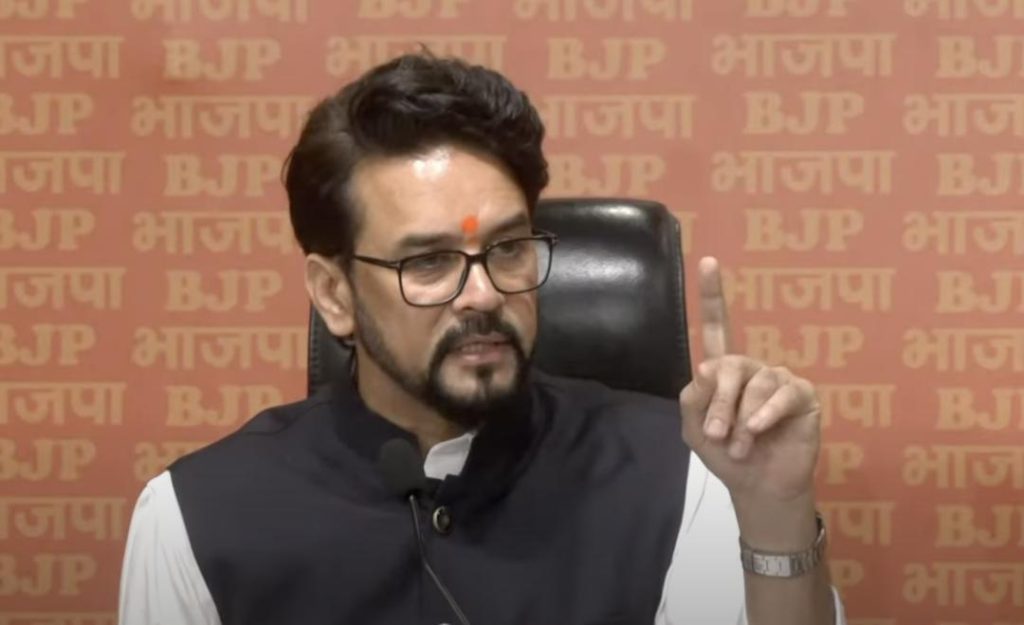
Title: Congress & CPI made Bhimrao Ambedkar lose the poll in 1952: BJP
The Indian political landscape is often marked by controversy and debates, and the recent statement made by BJP MP Anurag Thakur is no exception. In a recent speech, Thakur claimed that the Congress party, along with its communist allies, deliberately worked to ensure the defeat of Dr. Bhimrao Ambedkar in the 1952 elections. This statement has sent shockwaves across the nation, with many questioning the validity of Thakur’s claims. In this blog post, we will delve into the history of the 1952 elections and examine the facts surrounding Ambedkar’s defeat.
Who was Dr. Bhimrao Ambedkar?
Before we dive into the controversy, it is essential to understand who Dr. Bhimrao Ambedkar was. Born in 1891, Ambedkar was a renowned Indian social reformer, politician, and economist. He is best known for his efforts to improve the lives of the Dalit community, a group that faced significant social and economic discrimination in India. Ambedkar was a key figure in the Indian independence movement and played a crucial role in drafting the Indian Constitution.
The 1952 Elections
The 1952 elections were the first general elections held in India after independence. The elections were a significant event in Indian political history, as they marked the beginning of a new era in Indian democracy. The elections were contested by various political parties, including the Indian National Congress, the Communist Party of India (CPI), and the Bharatiya Jana Sangh.
Ambedkar’s Defeat
According to Thakur, the Congress party and the CPI conspired to defeat Ambedkar in the 1952 elections. Ambedkar had decided to contest the elections as an independent candidate, rather than joining a political party. This decision was seen as a bold move, as it allowed Ambedur to maintain his independence and not be beholden to any particular party.
However, Ambedkar’s decision to contest as an independent candidate ultimately led to his defeat. He lost the election by a significant margin, with his closest rival securing over 10,000 more votes than him. The exact reasons for Ambedkar’s defeat are still debated among historians and political analysts.
Thakur’s Claims
Thakur’s statement that the Congress party and the CPI conspired to defeat Ambedkar is based on his reading of the electoral rolls and the voting patterns in the 1952 elections. He claims that the Congress party and the CPI worked together to ensure Ambedkar’s defeat, and that 74,333 votes were rejected during the election.
Thakur’s claims are based on his analysis of the electoral rolls, which he claims show that a significant number of voters were registered in areas where Ambedkar was contesting. He also points out that the CPI, which was a strong opponent of Ambedkar, was contesting in many of the same constituencies as Ambedkar.
However, it is essential to note that Thakur’s claims are based on his own analysis and interpretation of the electoral rolls. While his claims may be plausible, they are not universally accepted by historians and political analysts.
Historical Context
The 1952 elections were held in a context of great uncertainty and instability. India was still reeling from the effects of the partition of the subcontinent, and the country was facing significant economic and social challenges.
At the time of the elections, the Indian National Congress was still reeling from the effects of the Quit India Movement, which had been led by Mahatma Gandhi. The movement had been brutally suppressed by the British, and many Congress leaders had been arrested and imprisoned.
The Communist Party of India, on the other hand, was a relatively new force in Indian politics. The CPI had been formed in 1920, and it had grown rapidly in popularity during the 1940s. The CPI was known for its strong opposition to the Congress party and its commitment to socialist and communist ideals.
Ambedkar’s Defeat: A Historical Reality?
While Thakur’s claims may be plausible, it is essential to note that Ambedkar’s defeat in the 1952 elections was a historical reality. Ambedkar’s decision to contest as an independent candidate was seen as a bold move, and it ultimately cost him the election.
It is also important to note that Ambedkar’s defeat was not unique to him. Many other political leaders and parties faced significant challenges during the 1952 elections, including the Indian National Congress and the Communist Party of India.
Conclusion
The controversy surrounding Thakur’s statement about Ambedkar’s defeat in the 1952 elections is a reminder of the complexities and challenges of Indian politics. While Thakur’s claims may be plausible, they are not universally accepted by historians and political analysts.
It is essential to understand the historical context of the 1952 elections and the challenges that Ambedkar faced during that time. Ambedkar’s defeat was a significant setback for him and his supporters, but it did not diminish his legacy as a social reformer and a champion of Dalit rights.
Source: https://youtu.be/0kLyW5rSJSg






